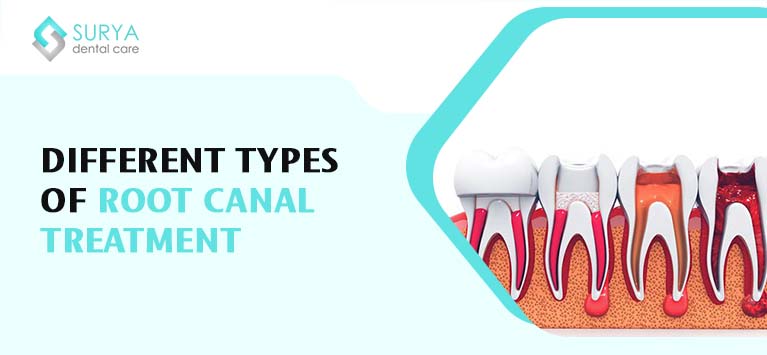
Your dentist may recommend root canal treatment to save your natural tooth if you have a damaged or diseased tooth. But most of us may not know the types of root canal procedures. And some of us don’t even know the exact procedures for root canals. In this blog, we explain different types of root canal treatment, and this will be useful for you to get to know the right treatment procedure for you.
What is root canal treatment?
A root canal is a common endodontic dental procedure performed to save the patient’s natural tooth by removing infected or inflamed pulp inside the tooth. Then it will be cleaned and disinfected, filled, and sealed to protect the tooth from further infections. It focuses on eliminating bacteria from inflamed or infected root canals, preventing reinfection, and saving the natural tooth from being extracted.
Different types of root canals:
There are two major types of root canal treatment: surgical and non-surgical root canal treatment. However, the goal of both procedures is the same.
Based on your dental history and the diagnosis of the problem, the dentist can determine the right procedure for you.
Surgical root canal treatment
It is performed when the non-surgical procedure fails or is insufficient to save the tooth or if the infection has spread deeply to the tip of the root. Surgical root canal treatment, often known as endodontic surgery, is required. This surgery is performed under local anaesthesia for the purpose of numbing the treated area. It is done to identify the hidden canals or small fractures that were undetected by X-rays during the initial treatment.
It is also performed to treat tooth bone surrounding infected or damaged tooth surfaces or eliminate calcium deposits in root canals. It is necessary in complicated cases when the inflammation or infection persists, the root end needs to be resected, or the tooth structure needs to be rebuilt.
During this procedure, your dentist will make an incision in the gum tissue to expose the tooth’s root tip. Then the infection will be removed, and the root canal will be done.
Non-surgical root canal
Non-surgical or conventional root canal treatment is one of the common types of root canal treatment. It is more detailed than typical normal filings because the extent of drilling goes further into the tooth’s root. It doesn’t require incisions in the gum tissue, and it is done in one or two visits.
While performing this procedure, your dentist will numb the area being treated using local anaesthesia. Then they will remove the infected pulp from the root canals. Once it was removed, they cleaned it and filled it with a special material. Sodium hypochlorite is used to clean the pulp chamber and canals to eliminate all traces of bacteria.
Until the final restoration is placed, your dentist will place a temporary filling to protect your teeth.
Some of the additional information about the types of root canal treatment is the following:
Pulpotomy:
Pulpotomy is one of the dental procedures done to save severely infected or decayed teeth. This procedure is commonly performed on children with primary teeth. It can sometimes be used for adults and older children who already have permanent teeth. It is used to remove infected pulp from the tooth’s crown.
Pulpectomy:
It is a root canal procedure used to repair and save decayed or infected teeth. It involves removing the nerve and the pulp of the tooth.
Apicoectomy:
It is a common dental procedure to remove inflammatory gum tissues and the tooth’s root tip while keeping the crown in place.
Retreatment:
This retreatment therapy is used to treat teeth when the previous root canal treatment fails. It involves removing the old or previous crown and packing material, cleaning the root canals, and replacing tooth crowns and tooth packing.
Endodontic microsurgery:
This surgery is performed to treat teeth with complex root canals or infections that spread severely to the tooth bone. During this surgery, your dentist will use a microscope to access the root canals and remove the infected pulp from the tooth tissues. It is also done to remove the calcium deposits inside the root canals.
Bottom line
Root canal treatment is a safe and effective treatment that can save your natural tooth. Although there are several types of root canal treatments, their purpose and work are the same. That involves removing infected or inflamed tooth tissues from the severely infected teeth.
If you have pain or sensitivity around your tooth or if you have fractured or decayed teeth, it is crucial to visit your dentist to determine the root canal procedure.



